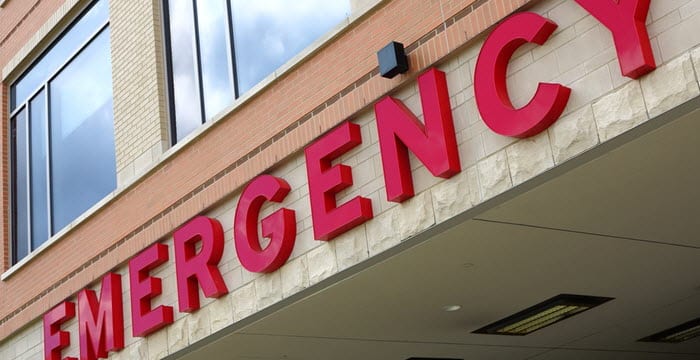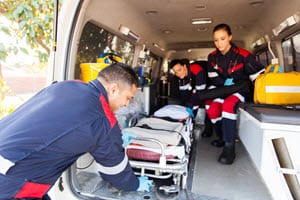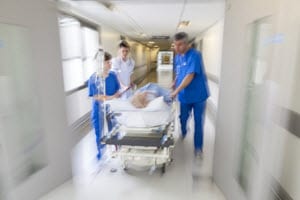 Free Consultation
(610) 667-7511
Free Consultation
(610) 667-7511
 Free Consultation
(610) 667-7511
Free Consultation
(610) 667-7511

When you visit the emergency room, you sometimes encounter a chaotic environment. Unfortunately, this chaos can lead to mistakes, especially if the doctors or other medical staff jump to conclusions about what is wrong with you. Sometimes, the failure to properly diagnose and treat you can lead to serious harm. This kind of harm can lead to extensive physical damage, medical bills, and even death. If you or a loved one suffered an injury due to a mistake in an emergency room, you may want to speak with one of our malpractice attorneys about your potential case.

Unless they are grossly negligent, first responders are immune from liability.
It is important to understand that first responders, such as EMTS, ambulance crews, and firefighters, have especially strong protection from lawsuits, if they do not provide appropriate medical treatment. The standard of care they face in Pennsylvania, New Jersey and other jurisdictions, is quite different from the traditional medical malpractice standard that is in place for those treating you in a hospital. However, this does not mean that first responders are completely immune from suit.
Pennsylvania has two good Samaritan laws. One if for first responders and bystanders and the second is for medical professionals.
First Responders and Bystanders
First responders who provides emergency care at the scene of an emergency is immune from civil liability, unless they are grossly negligent in their conduct. First responders are required to be properly certified. The treatment they provide must be”consistent with the nature and level of training for” their specific certificate. Drivers of emergency vehicles must drive appropriately or they and their businesses can be liable for car crashes in which patients are injured.
Medical Professionals
Physicians or nurses who provide treatment at the scene of an emergency are not be liable for any harm suffered by the injured individual, as long as they operate in good faith. However, they cannot be grossly negligent in the care they provide. In order for the medical provider to act on the scene, they must have a reasonable opinion that the, “care should not be postponed until the patient is hospitalized.
New Jersey has several laws protecting good Samaritans who help injury victims during an emergency. Individuals who help you outside of an emergency room are generally provided with civil immunity for providing that emergency care. This includes EMTs, ambulance operators, firefighters, police, doctors and even private citizens. There is also protection for doctors under specialized, emergency situations, even in a medical facility. However, the care provided must be in good faith. Also, the person providing the care must not act with conduct which is grossly negligent or reckless in nature. This means that, as long as the person acts in good faith in treating you under these limited circumstances, if you are injured by that treatment, they will not be liable for malpractice for harming you.

Bystanders who help you at the scene of an emergency are generally immune from suit.
Good Samaritan laws mean, for the most part, those who come upon you if you are injured, can treat you as long as they do so in a good faith belief that you need immediate care. Further, even if the treatment is negligent, they will not be liable to you for any injury. treatment must be rendered with gross negligence, or even with the intent to cause harm, for liability to attach. Remember though, first responders who drive you to the hospital must operate the vehicles appropriately. They can still be liable for a car accident, if they fail to follow the appropriate standards for emergency vehicles.
Those who treat you in an emergency room are expected to follow the appropriate standard for your treatment. This means that your doctors, nurses, and other medical professionals are obligated to follow a specific medical standard of care. This standard of care is based upon what other similarly situated medical professionals would do in the same situation. If those responsible for your care do not follow the correct standard, and they injure you as a result, they may be liable for medical malpractice. Further, the hospital which runs the emergency room may be liable as well.

Emergency rooms must follow the medical standard of care and provide proper treatment.
Most mistakes in emergency departments are due to human error. The most common problem in an emergency room is the failure to diagnose properly. Sometimes people are sent home in the middle of a heart attack, or told they have a sprain when something is broken. Other times, people may be left waiting too long, in violation of appropriate triage standards. Improper triage has lead to people dyingin waiting rooms. In such cases, the hospital and staff may be liable for the wrongful death of your loved one.
If you or a loved one suffered an injury due to improper treatment in an emergency medical facility, you may have the basis for compensation. Understand, in order to be successful, your injury must be worse than it otherwise would have been, but for the incorrect treatment. If your injury was not worsened, you will not have a claim. But, if the failure to timely provide treatment caused the damage to be worse, or the wrong treatment hurt you, you may be eligible for compensation for the injury.
To determine if you have a claim against an ER, please contact the litigators here at Lowenthal & Abrams. We will discuss what happened and provide an honest assessment of your case. The call is free and there is no fee unless we obtain compensation for you.
LOWENTHAL AND ABRAMS, P.C.

Contact us for a FREE consultation. No fee unless compensated.